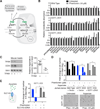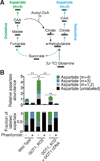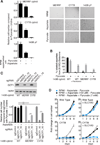An Essential Role of the Mitochondrial Electron Transport Chain in Cell Proliferation Is to Enable Aspartate Synthesis
- PMID: 26232224
- PMCID: PMC4522279
- DOI: 10.1016/j.cell.2015.07.016
An Essential Role of the Mitochondrial Electron Transport Chain in Cell Proliferation Is to Enable Aspartate Synthesis
Abstract
The mitochondrial electron transport chain (ETC) enables many metabolic processes, but why its inhibition suppresses cell proliferation is unclear. It is also not well understood why pyruvate supplementation allows cells lacking ETC function to proliferate. We used a CRISPR-based genetic screen to identify genes whose loss sensitizes human cells to phenformin, a complex I inhibitor. The screen yielded GOT1, the cytosolic aspartate aminotransferase, loss of which kills cells upon ETC inhibition. GOT1 normally consumes aspartate to transfer electrons into mitochondria, but, upon ETC inhibition, it reverses to generate aspartate in the cytosol, which partially compensates for the loss of mitochondrial aspartate synthesis. Pyruvate stimulates aspartate synthesis in a GOT1-dependent fashion, which is required for pyruvate to rescue proliferation of cells with ETC dysfunction. Aspartate supplementation or overexpression of an aspartate transporter allows cells without ETC activity to proliferate. Thus, enabling aspartate synthesis is an essential role of the ETC in cell proliferation.
Copyright © 2015 Elsevier Inc. All rights reserved.
Figures







References
-
- Bender A, Krishnan KJ, Morris CM, Taylor GA, Reeve AK, Perry RH, Jaros E, Hersheson JS, Betts J, Klopstock T, et al. High levels of mitochondrial DNA deletions in substantia nigra neurons in aging and Parkinson disease. Nature genetics. 2006;38:515–517. - PubMed
Publication types
MeSH terms
Substances
Grants and funding
LinkOut - more resources
Full Text Sources
Other Literature Sources
Research Materials

